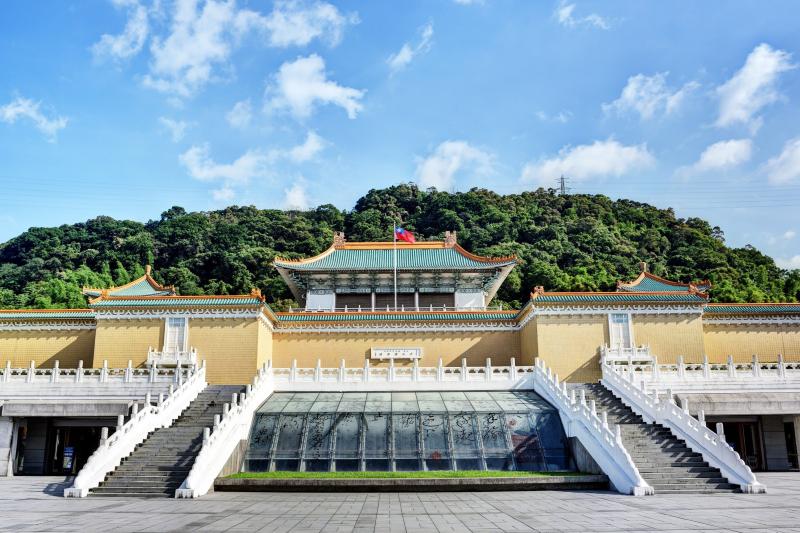The National Palace Museum, home to one of the world's biggest collections of imperial Chinese treasures, does not plan any joint events with China for its 100th anniversary due to Beijing's military threats, its director said today.
The museum was re-established in Taiwan in 1965 after the Republic of China government lost a civil war with Mao Zedong's (毛澤東) communists and fled to Taiwan in 1949, taking with them thousands of cases of antiques once owned by China's emperors.

Photo courtesy of the National Palace Museum
A competing institution remains in Beijing, the similarly named Palace Museum.
Speaking to reporters at the museum, National Palace Museum Director Hsiao Tsung-huang (蕭宗煌) said cooperation with Beijing's museum needed both sides to be willing to work together.
"Whether it is fighter jets, navy or civilian ships going up and down the Taiwan Strait, there is no opportunity like there was before for mutual friendliness or cooperation," he said, referring to China's almost daily military activities around Taiwan.
"We'd be happy to see it, but at the moment the other side has not taken the initiative to talk, and we even more cannot take the initiative to talk to them," Hsiao added.
The Palace Museum in Beijing did not immediately respond to a request for comment.
Instead, Taipei's museum is to send some of its collection to Prague and Paris this year, with the Qing Dynasty Jadeite Cabbage, one its most famous pieces which rarely leaves Taiwan, going on display at the Czech Republic's National Museum.
Next month, the National Palace Museum is to also host an exhibition of French impressionist and modernist art from New York's Metropolitan Museum of Art.
The National Palace Museum holds more than 690,000 items. More than 80 percent of them are from China's last dynasty, the former Qing court, which was overthrown in 1911.
A second branch of the museum opened in Chiayi County in 2015, and is being expanded to enable the public to see even more of the collection's artifacts.
It is to have a special focus on some of the museum's rarest pieces which Taiwan terms "national treasures."

The manufacture of the remaining 28 M1A2T Abrams tanks Taiwan purchased from the US has recently been completed, and they are expected to be delivered within the next one to two months, a source said yesterday. The Ministry of National Defense is arranging cargo ships to transport the tanks to Taiwan as soon as possible, said the source, who is familiar with the matter. The estimated arrival time ranges from late this month to early next month, the source said. The 28 Abrams tanks make up the third and final batch of a total of 108 tanks, valued at about NT$40.5 billion

Two Taiwanese prosecutors were questioned by Chinese security personnel at their hotel during a trip to China’s Henan Province this month, the Mainland Affairs Council (MAC) said yesterday. The officers had personal information on the prosecutors, including “when they were assigned to their posts, their work locations and job titles,” MAC Deputy Minister and spokesman Liang Wen-chieh (梁文傑) said. On top of asking about their agencies and positions, the officers also questioned the prosecutors about the Cross-Strait Joint Crime-Fighting and Judicial Mutual Assistance Agreement, a pact that serves as the framework for Taiwan-China cooperation on combating crime and providing judicial assistance, Liang

A group from the Taiwanese Designers in Australia association yesterday represented Taiwan at the Midsumma Pride March in Melbourne. The march, held in the St. Kilda suburb, is the city’s largest LGBTQIA+ parade and the flagship event of the annual Midsumma Festival. It attracted more than 45,000 spectators who supported the 400 groups and 10,000 marchers that participated this year, the association said. Taiwanese Designers said they organized a team to march for Taiwan this year, joining politicians, government agencies, professionals and community organizations in showing support for LGBTQIA+ people and diverse communities. As the first country in Asia to legalize same-sex

MOTIVES QUESTIONED The PLA considers Xi’s policies toward Taiwan to be driven by personal considerations rather than military assessment, the Epoch Times reports Chinese President Xi Jinping’s (習近平) latest purge of the Chinese People’s Liberation Army (PLA) leadership might have been prompted by the military’s opposition to plans of invading Taiwan, the Epoch Times said. The Chinese military opposes waging war against Taiwan by a large consensus, putting it at odds with Xi’s vision, the Falun Gong-affiliated daily said in a report on Thursday, citing anonymous sources with insight into the PLA’s inner workings. The opposition is not the opinion of a few generals, but a widely shared view among the PLA cadre, the Epoch Times cited them as saying. “Chinese forces know full well that